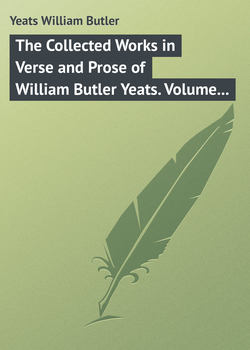Читать книгу The Collected Works in Verse and Prose of William Butler Yeats. Volume 8 of 8. Discoveries. Edmund Spenser. Poetry and Tradition; and Other Essays. Bibliography - Yeats William Butler, William Butler Yeats - Страница 2
DISCOVERIES
PERSONALITY AND THE INTELLECTUAL ESSENCES
ОглавлениеMy work in Ireland has continually set this thought before me: ‘How can I make my work mean something to vigorous and simple men whose attention is not given to art but to a shop, or teaching in a National School, or dispensing medicine?’ I had not wanted to ‘elevate them’ or ‘educate them,’ as these words are understood, but to make them understand my vision, and I had not wanted a large audience, certainly not what is called a national audience, but enough people for what is accidental and temporary to lose itself in the lump. In England, where there have been so many changing activities and so much systematic education, one only escapes from crudities and temporary interests among students, but here there is the right audience could one but get its ears. I have always come to this certainty: what moves natural men in the arts is what moves them in life, and that is, intensity of personal life, intonations that show them in a book or a play, the strength, the essential moment of a man who would be exciting in the market or at the dispensary door. They must go out of the theatre with the strength they live by strengthened with looking upon some passion that could, whatever its chosen way of life, strike down an enemy, fill a long stocking with money or move a girl’s heart. They have not much to do with the speculations of science, though they have a little, or with the speculations of metaphysics, though they have a little. Their legs will tire on the road if there is nothing in their hearts but vague sentiment, and though it is charming to have an affectionate feeling about flowers, that will not pull the cart out of the ditch. An exciting person, whether the hero of a play or the maker of poems, will display the greatest volume of personal energy, and this energy must seem to come out of the body as out of the mind. We must say to ourselves continually when we imagine a character: ‘Have I given him the roots, as it were, of all faculties necessary for life?’ And only when one is certain of that may one give him the one faculty that fills the imagination with joy. I even doubt if any play had ever a great popularity that did not use, or seem to use, the bodily energies of its principal actor to the full. Villon the robber could have delighted these Irishmen with plays and songs, if he and they had been born to the same traditions of word and symbol, but Shelley could not; and as men came to live in towns and to read printed books and to have many specialised activities, it has become more possible to produce Shelleys and less and less possible to produce Villons. The last Villon dwindled into Robert Burns because the highest faculties had faded, taking the sense of beauty with them, into some sort of vague heaven and left the lower to lumber where they best could. In literature, partly from the lack of that spoken word which knits us to normal man, we have lost in personality, in our delight in the whole man – blood, imagination, intellect, running together – but have found a new delight, in essences, in states of mind, in pure imagination, in all that comes to us most easily in elaborate music. There are two ways before literature – upward into ever-growing subtlety, with Verhaeren, with Mallarmé, with Maeterlinck, until at last, it may be, a new agreement among refined and studious men gives birth to a new passion, and what seems literature becomes religion; or downward, taking the soul with us until all is simplified and solidified again. That is the choice of choices – the way of the bird until common eyes have lost us, or to the market carts; but we must see to it that the soul goes with us, for the bird’s song is beautiful, and the traditions of modern imagination, growing always more musical, more lyrical, more melancholy, casting up now a Shelley, now a Swinburne, now a Wagner, are, it may be, the frenzy of those that are about to see what the magic hymn printed by the Abbé de Villars has called the Crown of Living and Melodious Diamonds. If the carts have hit our fancy we must have the soul tight within our bodies, for it has grown so fond of a beauty accumulated by subtle generations that it will for a long time be impatient with our thirst for mere force, mere personality, for the tumult of the blood. If it begin to slip away we must go after it, for Shelley’s Chapel of the Morning Star is better than Burns’s beer-house – surely it was beer, not barleycorn – except at the day’s weary end; and it is always better than that uncomfortable place where there is no beer, the machine shop of the realists.
